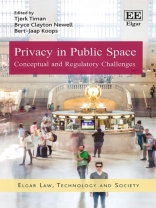‘A most welcome book on the most neglected of topics by a pioneering team of interdisciplinary scholars. The volume illuminates the rendering asunder of the borders that previously protected personal information, even when the individual was in ”public” and helps us see the muddying of the simple distinction between public and private. The book asks what public and private mean (and should mean) today as smart phones, embedded sensors and related devices overwhelm the barriers of space, time, physicality, and inefficiency that previously protected information. This collection offers a needed foundation for future conceptualization and research on privacy in literal and virtual public spaces. It should be in the library of anyone interested in the social, policy and ethical implications of information technologies.’- Gary T. Marx, Massachusetts Institute of Technology’How we should think about privacy in public spaces in a world of artificial intelligence and ubiquitous sensors is among the most interesting and pressing questions in all of privacy studies. This edited volume brings together some of Europe and America’s finest minds to shed theoretic and practical light on a critical issue of our time.’- Ryan Calo, University of Washington’The deepest conundrum in the privacy world-especially, in light of the internet of other people’s things-is perhaps the notion of privacy in public. Unraveling this practically Kantian antinomy is the ambitious aim of this important new collection. Together and apart, this intriguing assemblage of scientists, social scientists, philosophers and lawyers interrogate subjects ranging from conceptual distinctions between ”space” and ”place” and the social practice of ”hiding in plain sight”, to compelling ideas such as ”privacy pollution” and the problem of ”out-of-body DNA”. With this edited volume, the team from TILT has curated a convincing account of the importance of preserving privacy in increasingly public spaces.’- Ian Kerr, University of Ottawa, Canada With ongoing technological innovations such as mobile cameras, Wi Fi tracking, drones, and augmented reality, aspects of citizens’ lives are becoming increasingly vulnerable to intrusion. This book brings together authors from a variety of disciplines (philosophy, law, political science, economics, and media studies) to examine privacy in public space from both legal and regulatory perspectives. The contributors explore the contemporary challenges to achieving privacy and anonymity in physical public space at a time when legal protection remains limited in comparison to `private’ space. To address this problem, the book clearly demonstrates why privacy in public space needs defending. Different ways of conceptualizing and shaping such protection are explored, for example through `privacy bubbles’, obfuscation and surveillance transparency, as well as by revising the assumptions underlying current privacy laws. Scholars and students who teach and study issues of privacy, autonomy, technology, urban geography and the law and politics of public spaces will be interested in this book.Contributors include: M. Brincker, A. Daly, A.M. Froomkin, M. Galic, J.M. Hildebrand, B.-J. Koops, M. Leta, K. Mause, M. Nagenborg, B.C Newell, A.E. Scherr, T. Timan, S.B. Zhao
Bert-Jaap Koops & Bryce C. Newell
Privacy in Public Space [PDF ebook]
Conceptual and Regulatory Challenges
Privacy in Public Space [PDF ebook]
Conceptual and Regulatory Challenges
Compre este e-book e ganhe mais 1 GRÁTIS!
Língua Inglês ● Formato PDF ● ISBN 9781786435408 ● Editor Bert-Jaap Koops & Bryce C. Newell ● Editora Edward Elgar Publishing ● Publicado 2017 ● Carregável 3 vezes ● Moeda EUR ● ID 8075635 ● Proteção contra cópia Adobe DRM
Requer um leitor de ebook capaz de DRM












